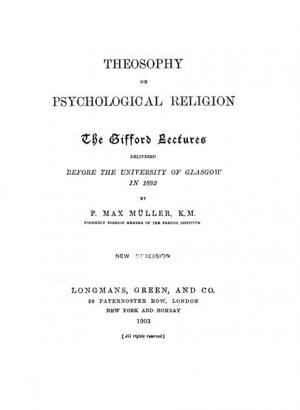In his final course of Gifford Lectures, delivered at the University of Glasgow in 1892, F. Max Müller concentrates on the essential unity or oneness of the objective Infinite in nature (God) and the subjective Infinite in man (soul), which is the final consummation of all religious and philosophical endeavours. Much time is spent discussing the relation of the soul to Brahman in the Hindu philosophy of Vedanta, and of similar strains in the Sufi branch of Islam. The final four lectures are, according to the author, the key to his whole series, demonstrating historically that Christianity, with its doctrine of the Logos, is neither merely a continuation or a reform of the Jewish faith, but rather a synthesis of Jewish and Western thought: this strength of the Christian faith is responsible for its unique ability to convince both the heart and the rational mind of its truth.
Theosophy or Psychological Religion
Books
Theosophy or Psychological Religion
Introductory Lecture: The Historical Study of Religion
Lecture 2: The True Value of the Sacred Books Examined
Lecture 3: The Historical Relationship of Ancient Religions and Philosophies
Lecture 4: The Relation of Psychological to Physical and Anthropological Religion
Lecture 5: Journey of the Soul After Death
Lecture 6: The Eschatology of the Avesta
Lecture 7: Eschatology of Plato
Lecture 9: The Vedânta-Philosophy
Lecture 10: The Two Schools of the Vedânta
Lecture 13: Alexandrian Christianity

Having discussed, in historical and philosophical light, mankind’s discovery of the objective Infinite in nature, i.e., God, Creator (in Physical Religion), and the discovery of the subjective Infinite in man, i.e., the soul (in Anthropological Religion), Müller’s final course of lectures, delivered under the title Theosophy, or Psychological Religion, treats mankind’s discovery of the oneness of the objective God and the subjective soul which, according to the author, ‘forms the final consummation of all religion and all philosophy&rs
- Brannon Hancock, University of Glasgow
- Sara Abraham, University of Glasgow


